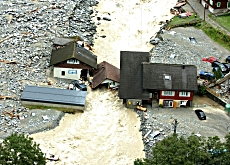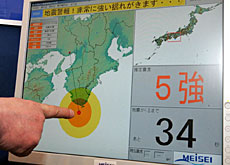Disaster experts seek ways to lower risks

Risk management experts from around the world meet in the Swiss Alpine resort of Davos this week at a conference on reducing the causes and effects of disasters.
Organisers of the International Disaster Reduction Conference (IDRC) say that recent mega-disasters have shown that risk management from a single approach is not enough to address the threats to today’s society.
“The IDRC Davos 2006 will address a broad range of risks, including those relating to pandemics and endemics, terrorism, climate change and natural hazards,” said conference chairman Walter J. Ammann.
“Risks of a technical, biological and chemical nature will also feature.”
About 1,000 participants from politics, public administration, business, industry, non-governmental organisations and science have registered for the event, which lasts till Friday.
Organisers say that a truly integrated and participative approach is planned to ensure that that valuable lessons learned about disaster risk reduction from a wide spectrum of fields are applied correctly for the benefit of communities, countries and regions.
Strategic platform
They add it will be a valuable forum and strategic platform for the world’s risk management community.
The programme will include topical plenary sessions and panel debates, scientific and policy-oriented thematic sessions, special regional sessions for Africa, Asia, North and Latin America, and Europe.
Side events organised by different international and national organisations will include exhibits and an open forum about media and disaster.
The forum will, among other issues, discuss what role journalists can and should play in crisis situations.
Journalists are often the first to arrive at the scene in war scenarios, after natural disasters or other catastrophes, sometimes even before emergency relief organisations.
Perception
Organisers say that the media strongly influence the way in which disasters are perceived in other parts of the world and in the areas affected.
But, they argue, the “right” way of reporting is difficult to define and the victims, relatives, relief organisations, editorial departments, politicians and the public hungry for facts or disaster stories often have conflicting interests.
The documentary film War Photographer by Swiss director Christian Frei will be shown to point out how much mental strength is needed to fulfil the challenging task of reporting back from conflict areas.
Frei and other media specialists will afterwards discuss the role journalism can and perhaps should play in disasters, as well as the necessary conditions for this.
swissinfo with agencies
The conference (August 27-September 1) is jointly organised by the United Nations International Strategy for Disaster Reduction, the UN Educational, Scientific and Cultural Organization, the Global Alliance for Disaster Reduction and the Global Disaster Information Network.
The main sponsor is the Swiss Agency for Development and Cooperation.
The International Disaster Reduction Conference in Davos is looking for sustainable solutions to the complex risks facing society today. It wants to serve as a bridge between practice, science, policy and the decision-making process.
The aim is to link problems and their main causes with governance and technology perspectives of problem solving.
Progress will also be reported in Davos on what has been achieved since the 2005 World Conference on Disaster Reduction in Kobe, Japan.

In compliance with the JTI standards
More: SWI swissinfo.ch certified by the Journalism Trust Initiative











You can find an overview of ongoing debates with our journalists here . Please join us!
If you want to start a conversation about a topic raised in this article or want to report factual errors, email us at english@swissinfo.ch.